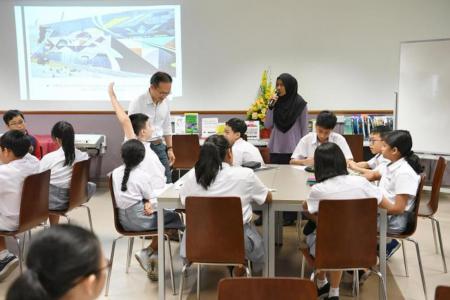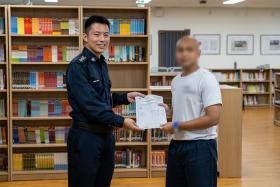Secondary school streaming to end by 2024
Subject-based banding to be implemented in all secondary schools; N and O-level examinations to be replaced
In a pivotal move, the Ministry of Education (MOE) announced yesterday that streaming in secondary schools - which groups students into Express, Normal (Academic) and Normal (Technical) streams - will be abolished by 2024.
Instead, full subject-based banding (SBB) will be implemented in all schools.
In line with this, MOE will also do away with N and O levels and replace them with a common national examination.
In full SBB, students will take subjects at different levels, with General 1 (G1) mapped to the N(T) level standard, G2 to N(A) and G3 to Express.
SBB is a scheme where students can take subjects at different levels in both primary and secondary schools.
In the current scheme, SBB is offered only for English, mathematics, science and mother tongue. In full SBB, this will be extended to humanities subjects, such as geography, history and literature.
Announcing the change in Parliament yesterday, Minister for Education Ong Ye Kung admitted there are downsides to streaming, introduced in secondary schools 40 years ago.
They include labelling and stigmatisation, which MOE hopes to minimise with the new system.
Said Mr Ong: "More importantly, entering a stream that is considered 'lower' can carry a certain stigma or be self-limiting. Students can develop a mindset where they tell themselves, 'I am only a Normal stream student, so this is as good as I can be,' and it becomes self-fulfilling."
Streaming also assumes students need a certain pace of learning in all their subjects, when in fact, many students have uneven strengths across different subjects, he added.
When the first batch of students - the current Primary 2 cohort - reach Secondary 4 in 2027, they will graduate with a common secondary school certificate, which will be co-branded by Singapore and Cambridge.
The certificate will list the subjects completed and the standard band of each subject, said Mr Ong.
After their Primary School Leaving Examination (PSLE), pupils will be posted to secondary schools based on three scoring bands, which would indicate which level of subjects the pupil would mostly take.
For example, a pupil with a PSLE score of Achievement Level (AL) 23 or 24 will predominantly take a G2 suite of subjects but would be offered a G3 English in Sec 1 if he scores well for his English at PSLE.
He can also change his combination after Sec 1, if he is found to have done well in some subjects.
Conversely, he can take some subjects at a lower level, if he is unable to cope with the academic rigour.
The school will assess the student based on guidelines and assessment mechanisms, including their Sec One year-end examinations.
Although full SBB will only be progressively adopted in all secondary schools by 2024, 25 schools, chosen based on their readiness and their experience, will pilot aspects of full SBB from 2020.
Mr Ong explained: "So from three education streams, we will now have 'One secondary education, many subject bands'.
"We will no longer have fishes swimming down three separate streams, but one broad river, with each fish negotiating its own journey."
A new post-secondary pathway will also be rolled out in 2028 once the first batch sits for the new national examination.
With these changes, the schools can organise their classes differently. Most schools organise their classes based on streams.
Mr Ong also spoke about Edgefield Secondary School, which has taken a different approach in banding students.
Each form class consists of a mix of students from each of the three streams.
They attend common classes such as art and music together, and split up during their academic classes based on their ability.
Removal of streaming a good move by MOE, say parents
Education Minister Ong Ye Kung's announcement yesterday in Parliament on doing away with the Normal and Express streams in secondary schools by 2024 was met with approval from the House and later, from parents as well.
Parents who spoke to The Straits Times said that this is a good move by the Education Ministry (MOE), with some adding that it has potential to help reduce stigmatisation.
Mrs Dadina Ong recalled her own experience of being "branded as Normal" after the Primary School Leaving Examination.
The 42-year-old described it a scary experience.
"Everyone started judging and that shocked me," said Mrs Ong, who managed to get into the Express stream after Secondary 1 and went on to be a bank treasurer after getting a diploma in business in a polytechnic and a degree from an overseas university.
She is glad her son, who is in Primary 1, will grow up in a different system.
"This Normal and Express split is not necessary. It will be more relaxed now," she said.
Mrs Reshma Alwani, a housewife who has a daughter in Primary 1, welcomed the chance for her child to be in classrooms with those from other bands.
"We shouldn't be afraid to let them sit with others who score less in an exam. Instead, focus on their own learning ability... In fact when everyone is just as good or better than you, it can also be intimidating," she said.
But she, like other parents, also had concerns, such as how schools decide when students get to move across subject bands.
Will it still be based on a single exam, she asked?
"Sometimes the child is nervous or unwell on exam day and that can affect their performance," she said.
Another worry was what will happen to students who go to schools that offer mainly higher-level G3 subjects.
Housewife Diane Wee, 44, recalled how her Sec 2 daughter, who was posted to an all Express-stream school last year but had to transfer to another school after "dropping" to the N(A) stream.
While the move has benefited her child, she would have preferred if her child could have changed streams and yet stay at her first secondary school.
Changing streams was already emotionally trying for her daughter, and it was made tougher by having to find another school.
She said: "Changing schools was inconvenient as we had to hunt around for another that could admit her in Sec 2. Most schools we approached told us to just apply and wait."
Get The New Paper on your phone with the free TNP app. Download from the Apple App Store or Google Play Store now



